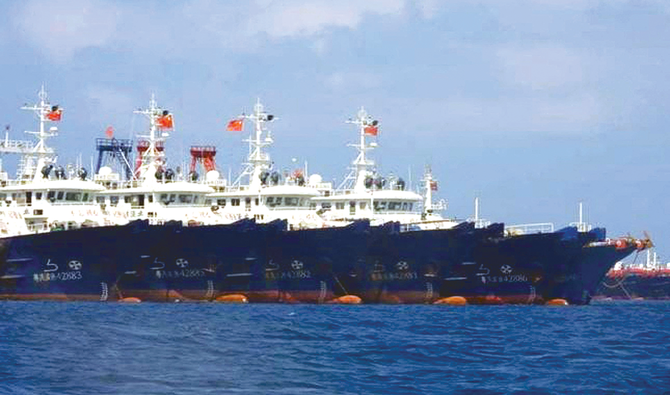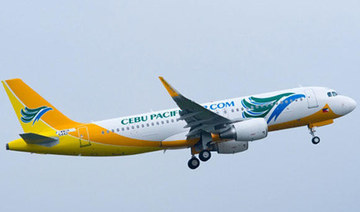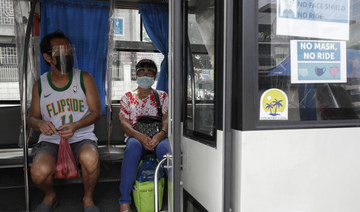MANILA: The Philippines on Wednesday denounced the “lingering presence” of Chinese militia vessels at the Julian Felipe Reef, which experts said could be a “prelude” to another occupation and construction of a military base in disputed waters in the South China Sea.
The government first protested against China’s move on March 21.
However, in a strongly worded statement on Tuesday, the Department of Foreign Affairs (DFA) demanded that China “promptly withdraw its fishing vessels and maritime assets in the vicinity and adjacent waters in the Kalayaan Group of Islands in the West Philippine Sea.”
The government also reiterated its demand for China to withdraw its maritime assets and cease its “environmentally destructive activities” in the area.
The Philippines has been protesting against the illegal presence of Chinese fishing vessels and maritime assets in the areas.
“Julian Felipe Reef in the Kalayaan Island Group lies in the Philippines’ EEZ (Exclusive Economic Zone). We reiterate that the continued deployment, lingering presence and activities of Chinese vessels in Philippine maritime zones blatantly infringe on Philippine sovereignty, sovereign rights, and jurisdiction,” the statement said.
It added that China’s “continuing infringements” are “contrary” to its commitments under international law and the ASEAN-China Declaration on the Conduct of Parties in the South China Sea.
Further, it called on China to “faithfully honor its obligations as a State Party to the 1982 UN Convention on the Law of the Sea (UNCLOS) and respect and abide by the final and binding 12 July 2016 Award in the South China Sea Arbitration.”
Experts, however, said there is more to China’s moves than meets the eye.
“This is a prelude to occupying the Julian Felipe Reef, just like what they did to Mischief Reef in 1995,” retired Supreme Court Justice Antonio Carpio said during a TV interview on Wednesday.
He was referring in part to Beijing’s occupation of another area off the Philippine coast, which has since been turned into a Chinese military base.
“They started with saying they just built fishermen’s shelter on Mischief Reef. Mischief Reef is their air and naval base; they call it their Pearl Harbor in the South China Sea. It’s a huge air and naval base,” Carpio added.
Carpio, who represented Manila at the Hague in its case against Beijing, said he was “particularly worried” as this was not the first time that Chinese fishing vessels, reportedly operated by the militia, had swarmed Julian Felipe Reef.
He pointed out that “at the same time last year, they also parked hundreds of their ships” in the area.
“They were saying that they took shelter because of a storm. But no storm was anywhere near Julian Felipe Reef,” he said, adding: “They cannot do that. While they can exercise the right of navigation, they can not just sit there, park there, because that is not their EEZ.”
The former Supreme Court judge said that President Rodrigo Duterte has “befriended” China and considered Beijing as his “best friend.”
“In fact, he said, ‘I love Xi Jinping.’ But that love has not been reciprocated,” Carpio said, noting that “China has in fact seized Sandy Cay,” a sandbar within the Philippines’ territorial sea in Pagasa Island.
China had also sent hundreds of ships to “swarm around the area.”
Citing the example of Sandy Cay — the first geologic feature that China seized under Duterte’s rule — Carpio said that the government was “still in denial” about the incident.
“This happened in 2017. The Duterte administration is still in denial. But we cannot go back to Sandy Cay anymore because it’s surrounded by maritime militia vessels of China,” he said, warning that Filipinos “should be very wary of what’s happening there.”
Filipino MPs also denounced China’s latest move, with opposition Sen. Risa Hontiveros saying on Wednesday that China should “stop twisting the truth” after its embassy in Manila denied reports about the presence of 220 Chinese maritime militia vessels near the Julian Felipe Reef.
“China is gaslighting us. China is making it appear as if we are hallucinating. We are tired of their attempts to twist the truth for their own interests. China has stolen from us, and now she is lying to us,” Hontiveros said in a statement.
China’s Embassy issued a statement on Monday saying that “there is no Chinese maritime militia as alleged,” contradicting the government’s National Task Force for the West Philippine Sea’s report.
The embassy also referred to Julian Felipe Reef by its Chinese name Niu’e Jiao, insisting that the reef is part of China’s Nansha administrative district in the South China Sea.
“The existence of Nansha district alone is illegitimate. How dare the Chinese embassy say that we are the ones causing ‘unnecessary irritation’? China is the one that violated the law; why should the Philippines be the one to adjust,” Hontiveros said.
Sen. Richard Gordon, one of Duterte’s allies in the Senate, said that the Chinese government’s coercive and destabilizing actions in the West Philippine Sea and the South China sea “belie its pronouncements of friendship and goodwill and affinity with the Filipino people.”
He added that as a major power, a permanent member of the UN Security Council, and signatory to many treaties and international agreements and conventions, China should “set the example of responsible governance with policies and actions that adhere to its international commitments.”
Meanwhile, several countries aired their concerns over the latest situation in the South China Sea, with Washington expressing its support to the Philippines on Tuesday.
“The US stands with our ally, the Philippines, regarding concerns about the gathering of PRC (People’s Republic of China) maritime vessels near Whitsun Reef,” Department of State spokesperson Ned Price said on Twitter.
“We call on Beijing to stop using its maritime militia to intimidate and provoke others, which undermines peace and security,” Price added.
Pentagon press secretary John Kirby also said that — as specified by US Defense Secretary Lloyd Austin during his recent trip to Asia — America is “deeply concerned by the aggressiveness particularly in terms of the maritime claims that the PRC is making.”
Meanwhile, Australian Ambassador to the Philippines Steven Robinson also tweeted that “Australia supports an #IndoPacific region which is secure and inclusive.”
“The South China Sea, a crucial international waterway, is governed by international rules and norms, particularly UNCLOS. We remain concerned about destabilizing actions that could provoke escalation,” he said.
Washington and Canberra were joined by Japan, which stressed that issues related to the disputed waters are “directly related” to the region’s peace and stability and a “concern for all” as it reiterated support for “free, open, and peaceful seas” and the enforcement of the rule of law.
Meanwhile, British Foreign Minister Nigel Adams also noted the UK’s “concerns” on the South China Sea, particularly “actions which raise tensions in the region.”




























